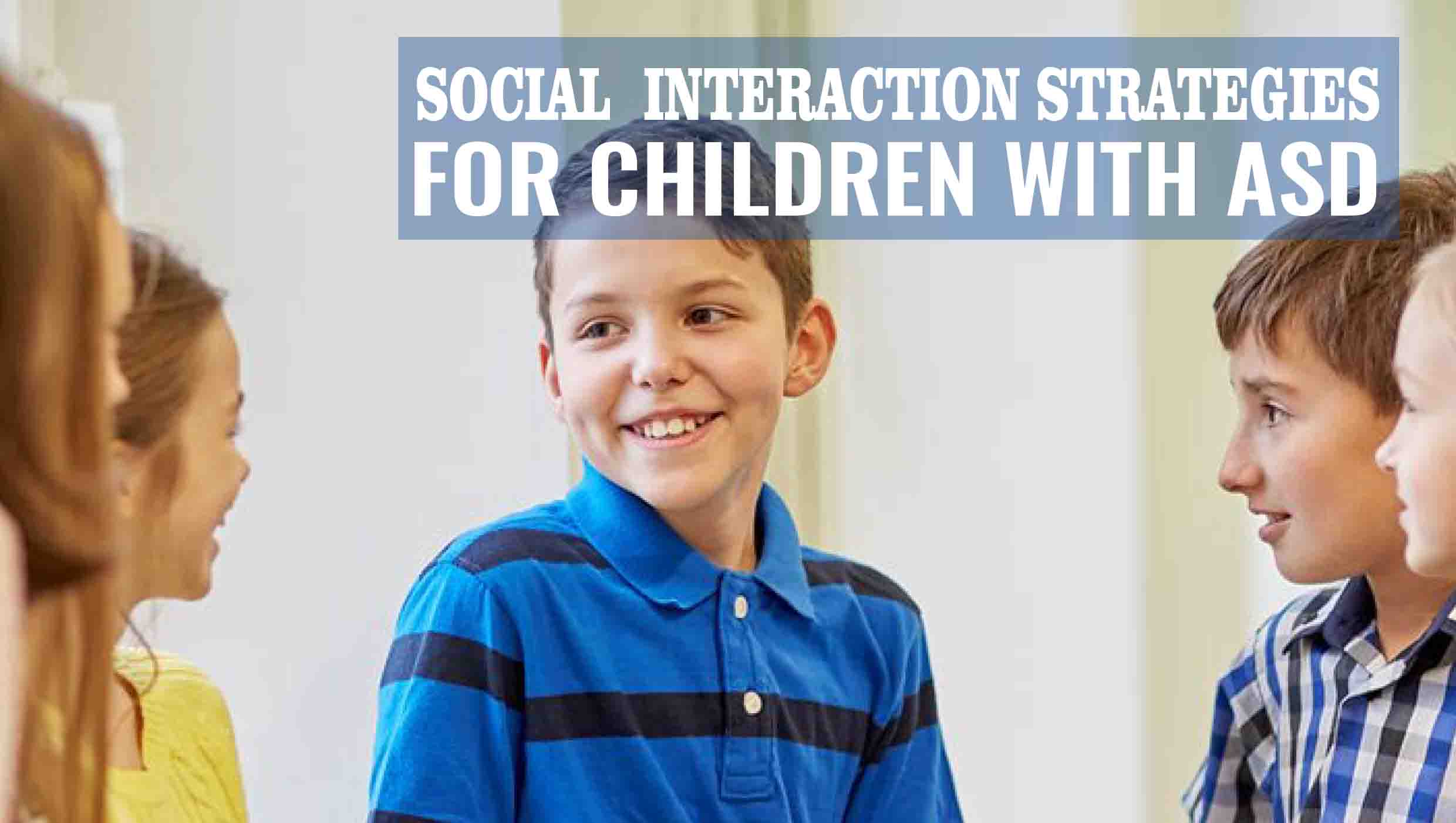Social interaction strategies for children
By: Kanchan Vishwakarma
Man created society to fulfil his social needs which give physical, emotional, physiological, psychological, spiritual satisfaction. This satisfaction gives a feeling of ecstasy and we acquire it by interacting within the society. Interaction with others help us live an enriched life. This involves expressing our feelings, thoughts, and emotions. Our life revolves around understanding others and making others understand us.
Imagine the feeling of being with people who appear to be strangers? It’s like living alone in a crowdedworld. And now imagine being conscious only about your needs and wanting them to be satisfied. Life here becomes just a survival, with basic bodily needs and dependence for their fulfilment. Needs here also include innate in-born strengths/talents which get showcased by default.
This is the world of an autistic child.
We, Humans have been blessed with the most precious gift, The Brain. Brain which controls the working of all complex systemsof the most complicated machinery of the world, our body. Brain has its own way of functioning. Every neuron of the brain stores and retrieves information only through connectivity, association or link. Every incident of our life creates an emotion giving pain or pleasure. They help to create the link to store information. In this way emotions help to create memories. Memory facilitates learning. Autistic child has feeling of emotion which comes naturally as a need. Not as a source of pain and pleasure to create memory. They find it hard to recognise and control their naturally coming emotions which are actually needs. Emotions in them, are not a medium to connectto the stored information in neurons, creating difficulty in utilizing this information to interact with people and situations.
Every symptom of autism directs toward the missing thread of emotional connectivity of pain and pleasure to create memory. So here you have a child with a properly functioning brain, i.e., with all its strengths and weaknesses but inability to link or associate information through emotions. They can feel bad or good about an incident but cannot use that feeling to predict the response for a similar situation in future. This, is the neurological problem which causes difficulty in socializing as it involves judging, reasoning, analyzing, impulse control, rational thinking, interpretingetc.
ASD involves a range of neurodevelopmental disorders characterized by impaired social functioning and communication disturbances. Symptoms include intense focus on one item, unresponsiveness, lack of understanding social cues (like tone of voice or body language), repetitive movements, or self-abusive behaviour like head-banging. Other possible symptoms include learning to speak relatively late, not playing interactively with other children, avoidance of eye contact, lack of empathy, and social withdrawal. Children with ASD who have not developed sufficient language skills may act out by screaming or crying, to express their needs.
In short, life of an autistic child is based on his needs and his way of trying to fulfil them. An autistic child excels in talents which are innate. Their behaviour is not influenced by any external factor. They find it difficult to recognise and control their emotions. They focus only on what comes to them naturally. This is also the main reason for them to excel in their innate strengths or talents. But we need to develop communication skills in them so that they can fulfil their needs and lead a normal life.
We depict mainly two types of behaviour, Innate and learned. Autistic child shows extraordinary skills in areas like singing, dancing, painting, drawing, gymnastics, cooking etc. These skills are innate or in-born. They are conscious of strengths related to right brain and since they focus and do things that come to them naturally, they tend to excel in their skills. Use of logic with the help of left brain is extremely limited. This affects communication or interaction with others. We can also say that since their control over the conscious is extremely limited we need to make them follow a routine that gets set in their sub conscious so that they follow it by practice.
Socializingis a learned behaviour. After learning the basic do’s and don’ts we usually add our own logic and sensibility and make our life fulfilling. This is limited in an autistic child. They need to develop certain life skills to fulfil their needs and live a normal life. So we need to follow certain strategies to develop socializing skills in them. While using these strategies we need to keep in mind the basics of an autistic brain condition. They lack the ability to connect emotions to situations, so creating memories becomes difficult. We can help them to cope up by acquainting them with the expected possibilitiesof responses for various situations.We need to create a pattern or fixed sequence of the process of a particular skill or situation and imitate it repeatedly till he is able to follow it without any help. Lack of eye contact and attention adds difficulty in executing therapies of learned behaviour. So, we need to follow certain strategies to make this task simpler.
- Create a good role model–Children don’t listen and learn; they observe and learn. This is applicable for every child including those with autism. They need a role model whom they trust and are comfortable with. This role model can be a peer or a sibling and even parent or grandparent. If we need to teach them to take bath, brush teeth or do any activity let them follow their peer or sibling. Instead of giving instructions they learn better when they have to observe someone doing the same activity involving them in it persistently like taking bath with a sibling and making him follow him will create better results. Taking the child to all your small gatherings and allowing them to observe you interact is also an important learning for him.
- Pick the time carefully to introduce new social skills- an autistic child lives in a shell of his own. It’s difficult to introduce him to new situations when he is not in a right mind frame to do so. Times when he is tired, not had enough sleep or is hungry can make him cranky. He will not be in a position to cooperate. We need to pick timings according to his convenience and not ours.
- Follow their interest- Autistic child lacks connection with the outside world. They live in their own world which involves responses to their innate qualities. When they are doing activities of their choice like swimming or drawing based on their strengths, they depict positivity and high energy level. Their acceptance towards the outer world is receptive. Mind is open and charged. When you follow their interest, it will make them happy. Utilize this period to practise an interaction. Create a set pattern and follow it regularly till they start doing it on their own. For eg if the child loves singing and is being taken to the class for the lessons. He will wish the teacher,say hello to the other classmates. The pattern is followed till he learns and follows it subconsciously.
- Know your child’s limits- understand and accept the limitations of your child. Acceptance is the first step towards treatment. Replace expectations by acceptance and you will get better results. Never force him to get out of his shell by force. Be patient and try to increase his confidence slowly and persistently. Never force him to do anything out of his reach or capacity. Simple things like taking bath, that you feel are easy can be extremely challenging for him.
- Practise role play for all possibilities of a situation – An autistic child has no or limited control over the conscious mind. Make a planner of every social situation with all possible options. Make a skit for those situations. Practise a role play every day with the same sequence. Let the situation get into his subconscious by repeated practise. If the role play is in the actual places it will become all the more easier for him to practice like visiting a mall, a shop, a garden, library, theatre and so on. Parent should try to give him maximum exposure of real life situations and follow similar patterns till they get accustomed to it.
- Use behaviour specific praises- The child feels accepted with positive reinforcement. Create and use certain behaviour specific praises to encourage better social skills. He will start recognising acceptable and unacceptable behaviour due to the repetition of specific praises.
- Avoid shaming – shaming is our way of venting out frustration. This can be disastrous as it can stop him from making any attempts to break the shell. Instead if he shows inefficiency to do a particular task tell him of how you were incompetent yourself when you were small and how you never gave up till you could do it. Make his incompetence an opportunity to prove himself.
- Start with basics and progress in stages – every simple activity has to be broken down into stages. We need to move from simple to complex and progress in stages. Till the child is not well verse with every step he should not be introduced to the next step. Rushing through the stages can make him lose his confidence and again drive him into his shell.
- Link social skills to real tangible situations – Considering the difficulties faced by the child we need to accept that he is unable to imagine or assume things and situations. Every skill should be linked to real life situations. We cannot explain a situation to him and expect him to learn by imagining it. If we want to help him socialise with his friends in a garden, we need to actually take him there and have actual scripted conversation with his peers.
Autistic child lives in his own world where he feels he is safe. Breaking of this shell is against his wish. What we feel is important for him is an unimportant unwanted task for him. Without his cooperation we cannot help him overcome challenges of his life. Patience and persistence are the only way to create an accepting world for him. Every child is different. Every child is special. Let us help them achieve their best, and live with confidence. Follow the mantra by repeating it to yourself while handling an autistic child ‘‘little is more’’


Nice article. Autism impacts an individual throughout the lifespan. However, research shows that early diagnosis can lead to improved quality of life. Today Clinical Psycholigists, occupational therapists and speech therapists are continuously working on it. This article will certainly help in understanding autism with its broad spectrum.
Very informative